Exploring High-End Bird Cages: Elegance and Functionality
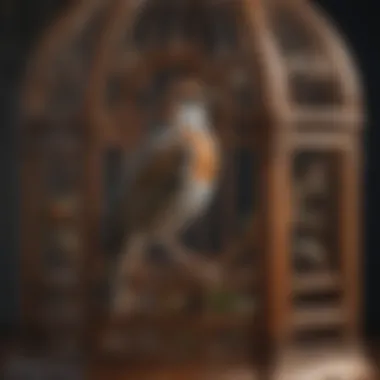
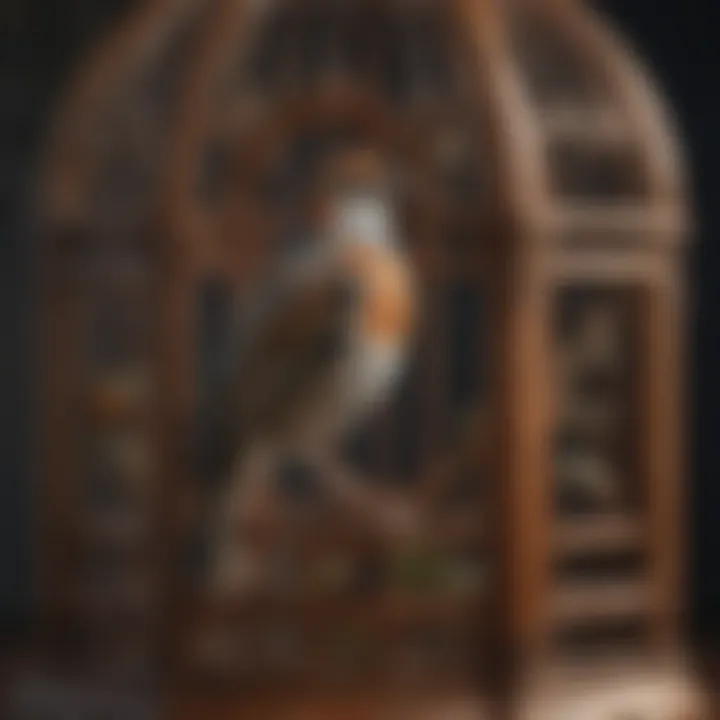
Intro
High-end bird cages represent a crucial aspect of pet ownership that goes beyond mere functionality. These cages serve not only as a home but also as a sanctuary for our avian friends. Selecting a well-designed cage is essential for ensuring that the physical and emotional needs of birds are met.
This article aims to provide an overview of high-end bird cages, examining their elegant designs and how they contribute to the overall wellbeing of birds. The objective is to guide discerning pet owners through the nuances of choosing a cage that will both delight the eye and cater to the specific needs of their feathered companions.
Understanding Your Pet
Understanding the unique characteristics of your bird is the first step in selecting a suitable cage. A deep comprehension of pet behavior, breed traits, and specific requirements can make the difference between a joyous living environment and an inadequate one.
Pet Behavior Basics
Birds are social creatures that thrive on interaction. Their behaviors often signal their internal states. For instance, a bird that sings frequently is likely content, while one that constantly plucks its feathers may be stressed. Observing these behaviors is vital.
Common Breed Characteristics
Different bird species have diverse traits. Parrots, for example, are known for their intelligence and need for stimulation, while finches are more solitary and require less interaction. Understanding these characteristics allows for informed decisions on the type of cage that is appropriate.
Species-Specific Needs
Each species has specific requirements. Large birds like macaws need spacious cages with ample perch space, while smaller birds like canaries might be content with more compact alternatives. The key is to align the cage design with the needs of the particular species.
Pet Care and Maintenance
Caring for birds involves more than just feeding them. Maintenance of their environment is crucial for their overall well-being.
Feeding Guidelines
A balanced diet is essential. Offering seeds, fruits, and vegetables ensures birds receive necessary nutrients. Avoid products high in sugar or fat.
Grooming Essentials
Regular grooming helps keep feathers in good condition. Tail and wing clipping may be necessary for some species to prevent injury, while regular baths help maintain feather hygiene.
Hygiene Practices
Cleaning the cage regularly is important. This includes replacing food and water daily and performing a deep clean of the cage at least once a month to prevent illness.
Training and Development
Training is an integral part of bird ownership. It nurtures the bond between owner and bird, making for a more harmonious relationship.
Basic Commands and Skills
Teaching birds simple commands can be beneficial. Start with basic training like step-up commands or recall, which enhances the pet's ability to follow direction.
Behavioral Training Techniques
Positive reinforcement is effective. Rewarding good behavior with treats or praise encourages birds to repeat these actions.
Addressing Common Behavior Issues
Common issues such as biting or excessive noise can often be mitigated through consistent training and environmental adjustments. By identifying triggers and addressing them, pet owners can cultivate a positive environment.
Health and Wellness
Monitoring a bird's health is essential for its longevity and happiness.
Routine Vet Check-ups
Regular veterinary visits help catch potential health issues early. A veterinarian familiar with avian medicine can provide targeted advice.
Vaccination Needs
Vaccinations are necessary for some species. Consult with your vet to determine what is needed based on your bird’s breed and lifestyle.
Recognizing Signs of Illness
Watch for any sudden changes in behavior. Symptoms such as lethargy, not eating, or unusual droppings may indicate health issues that require attention.
Enrichment and Activities
A bird's life should not be confined solely to its cage. Enrichment activities are important to maintain mental and physical health.
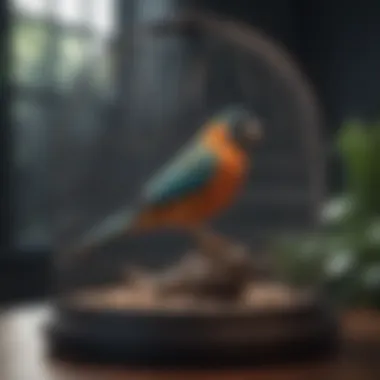
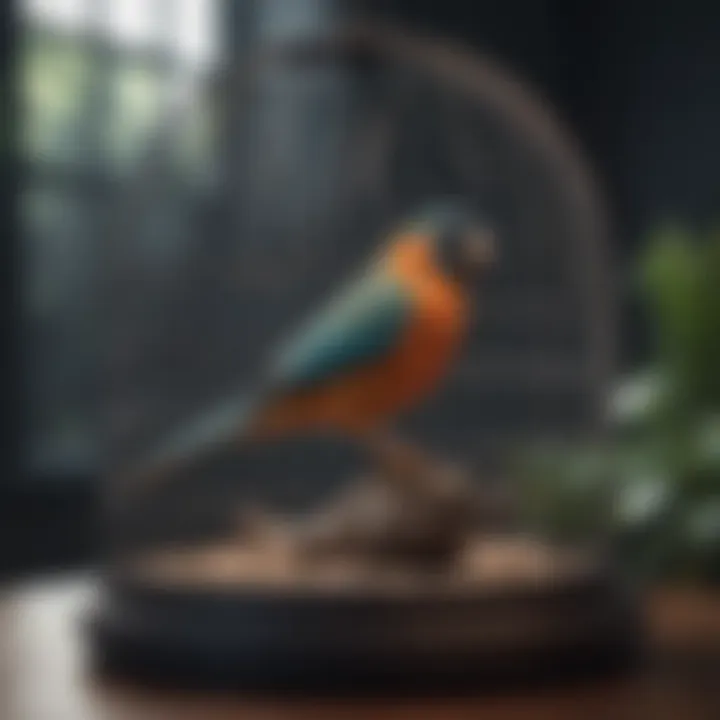
Indoor vs.
Outdoor Activities
Providing opportunities for safe outdoor time can greatly enhance a bird's quality of life. Indoor playtime is also critical and can be varied with different toys and perches.
Interactive Toys and Games
Toys that stimulate birds mentally and physically are invaluable. Consider puzzles or forage toys that require problem-solving skills.
Socialization Opportunities
Birds are social animals. Interacting with other birds or gentle pets can reduce loneliness and develop social skills, provided it is done in a controlled manner.
Choosing the right high-end bird cage is more than an aesthetic decision; it has direct implications on the health and happiness of your pet.
Intro to High-End Bird Cages
When considering the world of avian companions, the choice of their habitat plays a crucial role. High-end bird cages not only provide a home but also reflect the owner's taste and commitment to the well-being of their pets. This section aims to emphasize the importance of selecting quality cages, exploring their characteristics, and understanding the current market landscape.
Definition and Characteristics
High-end bird cages are distinguished by their thoughtful design and superior craftsmanship. They often employ high-quality materials, such as stainless steel or specially treated wood, which ensure both durability and aesthetic appeal. These cages are larger than standard options, allowing for ample space for birds to fly and thrive.
Key characteristics of high-end bird cages include:
- Innovative Design: These cages often incorporate spacious interiors, sustainable materials, and aesthetically pleasing exteriors.
- Safety Features: High-ned cages prioritize the safety of birds, often featuring escape-proof doors and non-toxic finishes.
- Customization Options: Many brands offer variations in layout, allowing owners to tailor the cage's interior to suit specific species or individual bird behaviors.
The emphasis on quality ensures not only longevity but also caters to the unique needs of different bird species, contributing significantly to their health and happiness.
The Market Landscape
The high-end bird cage market reflects a growing awareness of pets as valued companions rather than mere animals. More people understand the importance of providing an enriching environment, resulting in increased demand for superior products. Brands such as Avian Adventures and Mason Company have become notable for their commitment to innovation and quality.
Market trends show a rise in customized options. Pet owners now seek cages that match their interior decor or fit the specific needs of their birds. Fulfilling these requirements necessitates manufacturers to adapt to evolving consumer expectations.
Additionally, online forums and communities play a significant role in shaping buying decisions. For instance, platforms like Reddit provide insights and recommendations, guiding new buyers toward informed choices.
Overall, the high-end bird cage market represents a blend of sophistication and functionality, aimed at meeting the desires of discerning pet owners.
Materials Used in High-End Bird Cages
The choice of materials used in constructing high-end bird cages is essential. Not only does it affect the aesthetic value, but it also significantly influences the safety, comfort, and durability of the cage. A well-designed cage must use materials that ensure a safe environment for birds while complementing the decor of any home.
Metal Options: Stainless Steel vs.
Powder-Coated
Stainless steel is often regarded as the gold standard for high-end bird cage materials. Its advantages are numerous. First and foremost, stainless steel is incredibly durable. It resists rust and corrosion, which is crucial, especially in cages that may be exposed to moisture. In addition, stainless steel is easy to clean and maintain, which is vital for avian health. On the other hand, powder-coated metal is another popular option. While it can offer a wide range of colors and styles, concerns about its long-term durability may arise. Some coatings can chip or wear over time. This can expose the underlying metal, potentially harming the bird. Therefore, it is essential to consider the pros and cons of each material based on individual preferences and needs.
Wood Cages: Aesthetic Appeal and Maintenance
Wooden bird cages can provide an unmatched aesthetic charm. They can blend seamlessly into home settings, providing both function and style. Materials like cedar or hardwood are commonly used due to their natural beauty. However, purchasers must be aware that wood requires more maintenance when compared to metal options. Regular treatments may be necessary to prevent decay or wear. Moreover, some woods may contain chemicals or treatments that can be harmful to birds, so selecting untreated, natural wood is important. Balancing these concerns with aesthetics is key for those looking to invest in a wooden cage.
Plastic Elements: Safety and Durability
Plastic components in bird cages are often used for accessories like food containers or perches. These materials can be designed for safety, ensuring they lack sharp edges that could harm birds. Plastic is generally lightweight, which can be advantageous for transport. However, low-quality plastic may not withstand chewing or the wear and tear of daily use. It is wise to choose high-grade, bird-safe plastics when considering their use in a high-end cage. The right choice here can add both durability and safety to the cage's overall design.
High-end bird cages with proper materials not only ensure a safe environment but also enhance the aesthetic appeal of any living space.
Design Elements of Luxury Bird Cages
Design elements in high-end bird cages are crucial for creating an environment that balances aesthetics with the needs of the birds. Each component of the cage’s design contributes not only to the look of the cage but also to the comfort and well-being of its feathered residents. When selecting a luxury bird cage, the layout, size, and overall style should align with the specific needs of different bird species and their behavior patterns. This ensures a harmonious living space that respects both beauty and functionality.
Size Considerations for Different Species
When choosing a high-end bird cage, size is a critical consideration that cannot be overlooked. Different bird species have varying spatial needs based on their size, behavior, and activity levels. Larger birds, such as macaws or cockatoos, require spacious cages that allow them to spread their wings and move freely. An inadequate size can lead to stress and health problems for these birds.
For smaller birds like finches or canaries, a compact cage can suffice, but it still should offer multiple perches and room for movement. Ideally, the minimum space for a bird should support not just their size, but also their social and active nature. Providing enough room for physical activity helps prevent obesity and encourages healthy behaviors. Ultimately, it’s about ensuring each species can express its natural behaviors in a secure and comfortable environment.
Interior Layout: Perches, Toys, and Accessories
The interior layout of a luxury bird cage has several important functions, encompassing comfort, enrichment, and stimulation. Thoughtfully arranged perches in various shapes and materials can enhance a bird’s foot health and provide the necessary exercise. It's recommended to include several perches at different heights to mimic natural conditions.
Toys represent another vital element in enriching the living space. Offering a variety of toys designed for chewing, climbing, and foraging keeps birds mentally engaged. Accessories like food containers and water dishes should be easily accessible yet secured to minimize spills and contamination. Adequate space must be factored in for these items to avoid overcrowding the living area. Thus, a well-planned interior layout is essential for promoting healthy behaviors and overall happiness in birds.
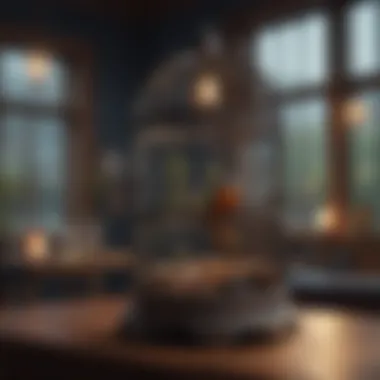
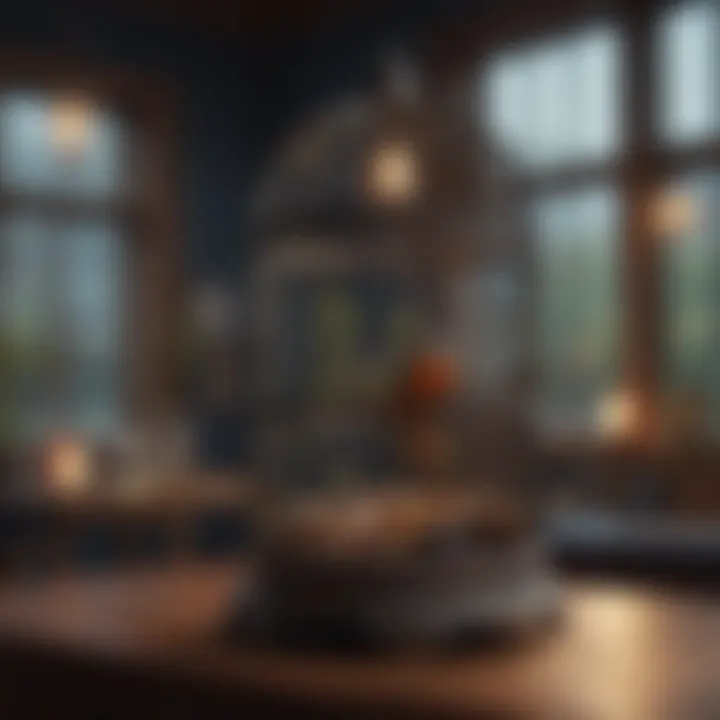
Exterior Aesthetics: Style and Function
The outer design of a high-end bird cage speaks to the owner's taste while serving practical purposes. Exterior aesthetics encompass the materials, colors, and overall structure. Luxury cages often feature sleek finishes, such as brushed stainless steel or elegant wood, which can seamlessly blend into home decor.
However, aesthetic choices should not compromise functionality. Cages with multiple access points facilitate care and maintenance. Consider cages with a removable tray for easy cleaning and maintaining hygiene without hassle. Additionally, using non-toxic finishes is essential to ensure the safety of the birds. Balancing style with these functional aspects provides a visually appealing product that also meets the essential needs of both birds and their owners.
A well-designed high-end bird cage promotes a serene environment while enhancing the aesthetic appeal of any living space.
Health and Well-Being of Birds
The health and well-being of birds is a paramount consideration when selecting high-end bird cages. A well-designed cage goes beyond mere aesthetics; it serves as a sanctuary that can significantly affect a bird's physical and psychological state. This section explores the essential aspects of cage environments and their impact on avian health. Understanding these factors is crucial for pet owners seeking to provide their feathered companions with optimal living conditions.
The Role of Cage Environment in Avian Health
Creating a suitable cage environment is fundamental for maintaining bird health. A high-quality cage fulfills various needs for different bird species. For instance, larger birds like macaws require spacious enclosures that accommodate their size and active nature, while smaller species like finches thrive in cages that offer multiple levels for climbing and exploration.
Key elements that contribute to a healthy cage environment include:
- Space: Ample room prevents stress and promotes physical exercise.
- Perches: Varied perch sizes and materials support natural behaviors.
- Hiding Spots: Providing areas for birds to retreat fosters a sense of security.
A positive cage environment not only encourages physical activity but also minimizes behavioral issues that stem from stress and boredom.
Ventilation and Natural Light Considerations
Good ventilation and access to natural light are crucial for bird health. Proper airflow reduces humidity and helps manage odor, which is vital for the bird's respiratory health. Without adequate ventilation, harmful bacteria and mold can thrive, posing serious health risks.
Natural light supports the regulation of birds' circadian rhythms. Just like humans, birds benefit from exposure to daylight, which is necessary for their overall well-being. Considerations should include:
- Window Placement: Positioning the cage near natural light sources can enhance the bird's mood and activity.
- Ventilated Design: Opt for cages with openings that facilitate airflow without allowing birds to escape or drafts to enter.
Cleaning and Maintenance for Optimal Health
Regular cleaning and maintenance of the cage are essential to ensure a healthy living environment. A dirty cage can lead to numerous health problems, including infections and illnesses. Here are several cleaning practices to consider:
- Daily Spot Cleaning: Remove uneaten food and waste to maintain hygiene.
- Weekly Deep Cleaning: Disassemble accessories and scrub surfaces using bird-safe cleaners.
- Monitor Health: Keep an eye on your bird's behavior and food intake, as changes may indicate health issues.
In summary, the well-being of birds hinges on a thoughtfully designed cage environment. By prioritizing health factors such as space, ventilation, and cleanliness, pet owners can create an elegant and functional home for their avian companions.
Functional Features of High-End Cages
Understanding the functional features of high-end bird cages is essential for any discerning pet owner. These features are not just about aesthetics; they play a critical role in ensuring the comfort and well-being of avian companions. Key elements such as accessibility, design flexibility, and mobility enhance both the bird's living experience and the owner's daily interactions with their pet. By prioritizing functionality, owners can create an enriched environment tailored to the unique needs of their birds.
Accessibility: Doors, Food Containers, and Easy Cleaning
Accessibility is paramount when it comes to high-end bird cages. Owners must be able to easily interact with their birds, and that is where well-designed doors come into play. Large, secure doors simplify the process of letting the bird out for playtime and safely returning it to the cage.
In addition to doors, thoughtful design includes easy-access food and water containers. These containers should be conveniently located to facilitate quick refills and cleaning without disturbing the bird too much. High-quality cages often feature removable food dishes, which prevent spills and reduce waste.
Cleaning is another essential aspect of accessibility. A cage that is difficult to clean can quickly lead to health problems for the bird. High-end options generally include removable trays that slide out easily, allowing for efficient waste disposal. Owners can maintain cleanliness with minimal effort, ensuring that their pets thrive in a healthy environment.
Flexible Design for Various Housing Needs
Flexible design is a hallmark of high-end bird cages. Not all birds are the same, and their housing needs can vary significantly. A cage that can adapt to different species, sizes, and behaviors is a valuable investment. For example, modular cages allow owners to modify the internal layout according to their bird's specific requirements.
Many premium bird cages come with adjustable perches, allowing for customization of the habitat. Owners can rearrange toys and accessories to create stimulating environments. This flexibility encourages birds to engage in natural behaviors, which is crucial for their mental health. Moreover, cages that can expand in size or reconfigure can accommodate growth or new companions.
Mobility Features: Wheels and Lightweight Materials
Mobility features are vital, especially for pet owners who enjoy moving their birds around the house. High-end cages often include wheels that can lock into place, allowing for easy transportation while ensuring safety. This design enables owners to bring their birds into different rooms, providing varied experiences and environments.
Lightweight materials further enhance mobility. Bird cages made from strong yet light materials are easier to lift and move without compromising stability. Owners can rearrange spaces or clean areas without significant hassle. Additionally, mobile cages allow for better access to natural light, essential for the well-being of birds.
A well-designed bird cage is more than a home; it functions as a sanctuary that fosters health, security, and happiness for avian companions.
In summary, the functional features of high-end bird cages are manifold. They include accessibility for both the owner and the bird, flexible designs that meet various housing needs, and essential mobility features that enrich the living experience. By taking these considerations into account, pet owners can ensure their birds have a safe, comfortable, and engaging living space.
Investment Value of High-End Bird Cages
Understanding the investment value of high-end bird cages is crucial for discerning pet owners. Selecting the right cage involves not just aesthetics but also a keen awareness of the long-term benefits and overall impact on both birds and their owners. Choosing a quality cage can enhance the livability for birds, contribute to their health, and lead to financial benefits over time.
Cost vs.
Quality: Understanding the Price Range
High-end bird cages can vary widely in price. Factors affecting cost include materials, brand reputation, and design complexity. A higher price tag often correlates with superior quality, durability, and aesthetic appeal.
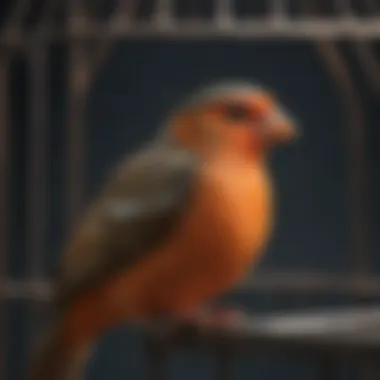
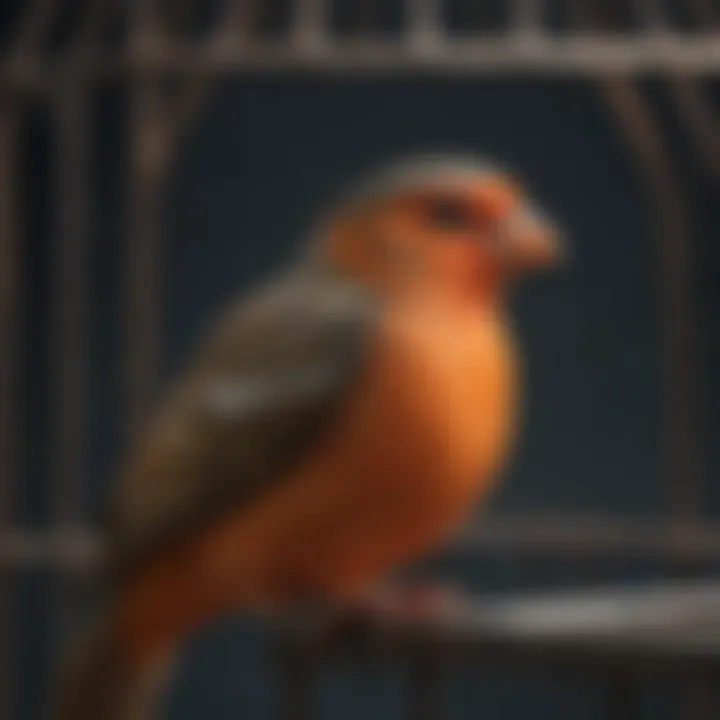
- Stainless Steel Cages: Priced higher, these cages offer longevity and resistance to wear, making them a sound investment.
- Designer Wood Cages: While visually stunning, these may require more serious maintenance, impacting overall cost-effectiveness.
- Functional Features: Cages equipped with advanced features command higher prices but might provide a better living environment for birds.
Assessing the relationship between cost and quality is key in making an informed decision. It is not merely about spending a large amount; it is about getting value for it.
Longevity and Durability: Long-term Benefits
A quality high-end bird cage can last for many years. This longevity translates into significant savings in the long run. Investing in a durable cage means that the owner will not have to frequently replace it, unlike more affordable yet less substantive options. A well-constructed cage is resistant to rust, wear and tear, while providing a safe environment for birds.
A rich variety of materials used in high-end bird cages, such as stainless steel and powder-coated metal, contributes to their longevity and durability. This durability not only ensures safety for the birds but also minimizes maintenance efforts required from the owner. A robust cage can lead to a more tranquil home for both the birds and their owners.
Resale Value Considerations
In addition to performance and utility, high-end bird cages retain a respectable resale value. Brands like King’s Cages and A&E Cage Company are known for their craftsmanship, making them sought after in the second-hand market.
Key points to consider about resale value:
- Market Demand: Popular brands often see higher resale values.
- Condition of the Cage: Well-maintained cages will fetch better prices.
- Upgrades and Parts: Availability of parts can enhance resale potential.
When considering purchasing a high-end bird cage, also think about its future resale opportunity. It can make the investment more financially viable.
Investing in a high-end bird cage is not merely an expenditure; it's a long-term commitment that offers numerous benefits, emphasizing quality over initial cost.
Top Brands in the High-End Bird Cage Market
When considering high-end bird cages, it is essential to explore the top brands in the market. These brands often set the standards for quality, design, and functionality. Understanding the landscape of high-end bird cages helps pet owners make informed decisions. Selecting a reputable brand ensures that the investment leads to lasting value and enhances the living environment of birds.
Brand Overview and Reputation
In the world of bird cages, reputation signifies a lot. Well-established brands in the high-end market are recognized for their commitment to quality and design. For instance, manufacturers like Hagen and A&E Cage Company have built a strong presence by ensuring durability, safety, and aesthetic appeal. Customers are often drawn to brands that have garnered positive reviews and consistent feedback from other pet owners. This emphasis on community trust aids potential buyers in selecting the right product, aligning with their values and expectations regarding pet care.
Key Considerations for Choosing a Brand:
- Customer Service: Brands with strong customer support offer peace of mind during the purchasing process.
- Warranty and Return Policies: A good warranty reflects a company’s confidence in its products.
- Sustainability Practices: Increasingly, consumers are considering eco-friendly practices adopted by brands.
Unique Selling Points of Leading Brands
Different brands present unique features that appeal to various customer needs and bird species requirements. For example, some brands focus on innovative design that caters to specific behaviors of birds, such as climbing or perching. Others may excel in using high-quality materials that ensure longevity.
Examples of Unique Selling Points:
- Hagen: Known for its well-engineered designs that facilitate easy access for cleaning.
- A&E Cage Company: Offers customizable cages that allow owners to select layouts based on their bird’s needs.
- Vision: Focuses on providing natural light and visibility, promoting the well-being of birds.
Remember: Not all brands cater to the same audience or bird species. Understanding what each brand offers can significantly shape your purchasing decision.
Choosing from reputable brands in the high-end bird cage market leads to a more satisfactory experience. Owners should consider the reputation, unique selling points, and overall quality when selecting a cage that not only meets aesthetic desires but also ensures the health and happiness of their avian companions.
Choosing the Right Cage for Your Birds
Choosing the right cage is crucial for both the happiness and the health of your birds. A well-selected cage not only provides safety, but also ensures an enriching environment tailored to the bird's specific needs. Each bird species has its own requirements concerning space, design, and features, making it essential for pet owners to take these factors into careful consideration. This section deepens understanding of bird behavior and the various elements that contribute to a suitable living space.
Assessing Bird Species and Behavior
Different bird species exhibit a range of behaviors, which should direct your cage selection process. Large parrots like African Greys and Macaws need more expansive and multi-level cages. These birds tend to be highly intelligent and social, requiring a setup that encourages exploration and play. In contrast, smaller birds such as finches or canaries may thrive in smaller, more enclosed environments, but still benefit from features that allow for movement and stimulation.
Key Considerations:
- Space Requirements: Ensure the cage is large enough for your bird's wingspan and movement needs.
- Social Behavior: Consider whether the bird is solitary or social, as some may benefit from shared space with others.
- Activity Levels: Assess how active your bird is; some may need more space to climb and fly.
Ultimately, the more you know about the specific needs and personalities of your birds, the better you can cater to their comfort and agility.
Factors to Consider When Buying
When buying a high-end bird cage, various elements come into play beyond just the species involved. It is prudent to think about the cage's functionality and how well it complements your living space. Here are some significant factors:
- Material Quality: Look for sturdy materials like stainless steel or durable wood that can withstand wear and tear from avian activities.
- Accessibility: Ensure that the cage has appropriate access points for feeding and cleaning. Options like removable trays can assist in simplifying maintenance.
- Design Features: Consider features such as multiple perches, toys, and a layout that promotes active engagement.
- Ventilation: Proper airflow is a must to maintain a healthy living environment.
- Ease of Cleaning: Choose designs with detachable components for hassle-free cleaning routines.
Overall, careful thought about these facets will not only enhance the living conditions for your birds but will also contribute to the longevity of the cage.
The End
Choosing a high-end bird cage is not merely about aesthetics; it is about merging elegance with functionality in a way that enhances the lives of both birds and their owners. In this article, we have explored various aspects of high-end bird cages, from materials and designs to health considerations and investment outlooks.
High-quality cages are thoughtfully designed to cater to the specific needs of different bird species, ensuring that each bird can thrive in an environment that promotes their health and well-being. Owners who invest in these luxury cages often reap significant benefits in terms of durability and aesthetic value, but they must also consider practical aspects such as maintenance, accessibility, and adaptability.
Critical elements in making the right choice include:
- Species Requirements: Every bird species has distinct needs that should dictate cage size, layout, and accessories.
- Material Quality: The choice of materials can affect durability and safety. Stainless steel is often preferred for its longevity and ease of cleaning.
- Design Features: Look for features that enhance functionality, such as multiple access points and easy-to-clean surfaces.
When owners select a high-end bird cage, they are not only providing a home for their feathered companions; they are creating a haven that supports health, socialization, and an enriched life experience. Thus, a well-chosen bird cage reflects a commitment to the care and quality of life of avian pets.
Ultimately, understanding how to blend elegance with essential features ensures that the right cage can be both a beautiful addition to the home and a nurturing environment for birds, meeting the needs of discerning pet owners who value quality and functionality.







